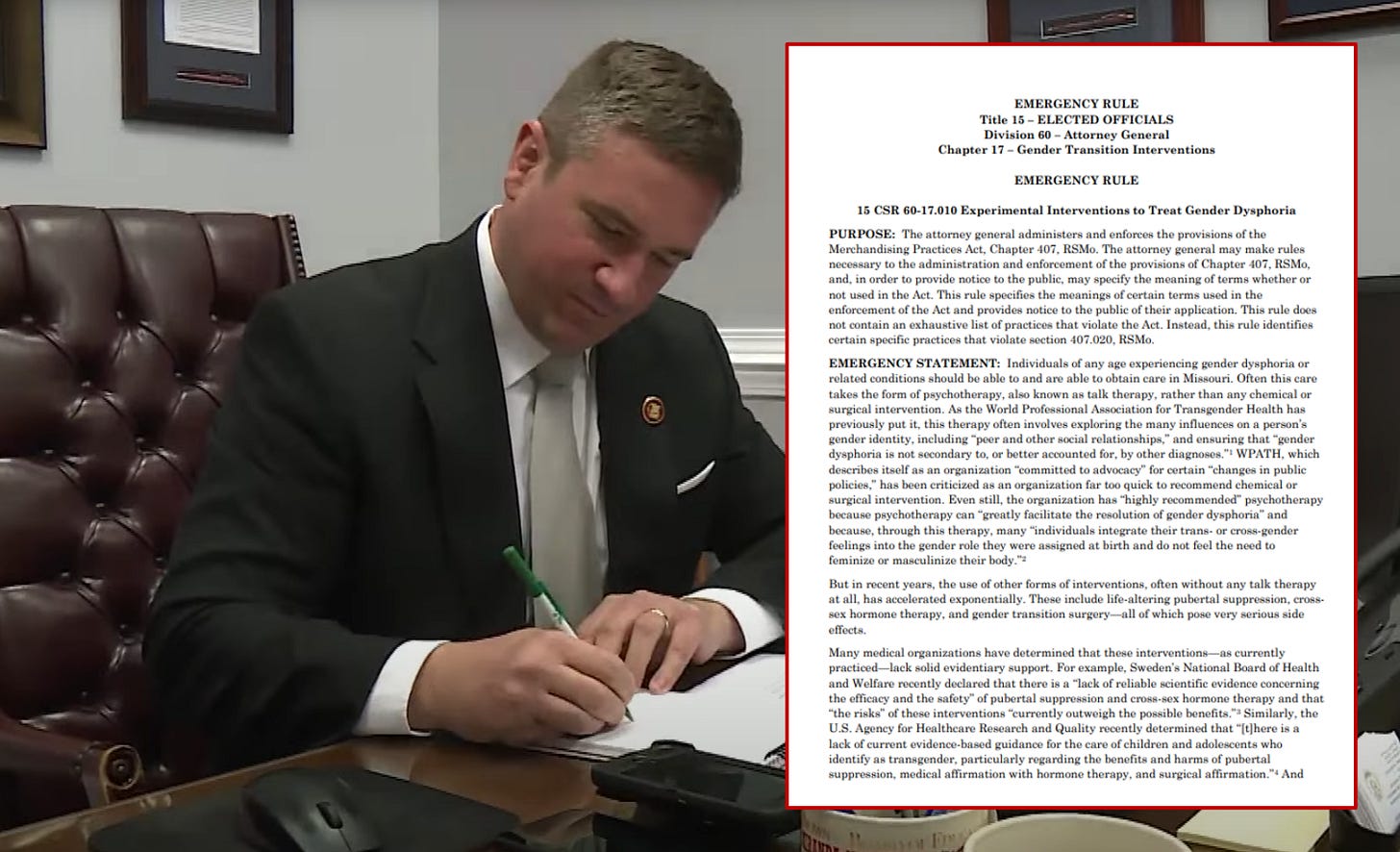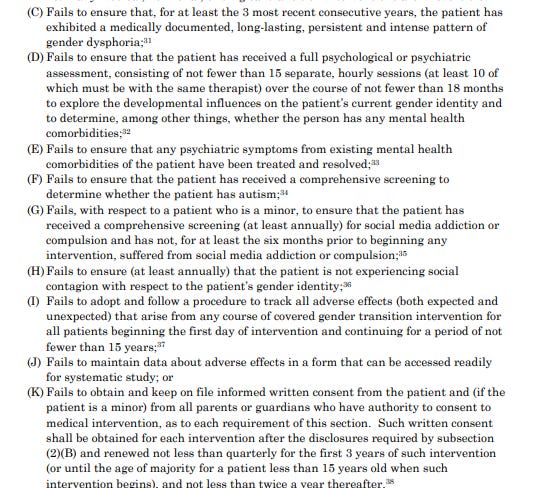Missouri AG Just Banned Most Adult Gender Affirming Care In Cruelest Anti-Trans Move Yet
The Attorney General of Missouri just unilaterally banned most adult gender affirming care. This decision is one of the most cruel policies ever released and represents a new front in this fight.
The fight for transgender rights just opened a new front line in Missouri: gender affirming care for transgender adults. Missouri's Attorney General, through a single executive action, has just banned or limited access to such care for a majority of transgender adults in the state. This unilateral decision is expected to leave tens of thousands of transgender Missourians without crucial medication or treatment. The move threatens to roll back transgender medical care to the level of the 1970s, seemingly fulfilling right-wing political commentators' ominous vows to eradicate transgender individuals altogether.
The full order utilizes emergency rulemaking powers to severely limit gender affirming care for all transgender people. It would require that all trans people have 3 years of severe, persistent gender dysphoria to obtain care, and would require 18 months of therapy sessions designed to “explore influences on the patient’s gender identity and mental health comorbidities.” It would require things like depression and anxiety to be resolved before starting gender affirming care, and would also ban that care for trans adults with autism. It would require tests for “social contagion” and would require 15 years worth of medical follow-ups for all trans adults. Collectively, these requirements would ban gender affirming care for most adults in the state.
See the full page of restrictions on trans adults here:
These provisions are exceptionally cruel. Many transgender people suffer from depression or anxiety before transitioning and gender affirming care is the most effective treatment. Banning gender affirming care for people experiencing this until it is resolved is like banning insulin until someone’s diabetes resolves. Often, depression and anxiety come as a result of lack of access to care and state actions taken to target transgender people. Ironically, this decree will likely exacerbate anxiety and depression among trans adults in and of itself. Likewise, banning autistic transgender people from care will harm them according to recent research.
The harshest provisions, though, are the ones that implement years-long waiting periods. To delay gender affirming care for three years for transgender adults is exceptionally cruel. Most gender affirming care in America is done according to WPATH standards via informed consent and no forced waiting period. The benefits of prompt gender affirming care are recognized by the WPATH, which the order itself references. WPATH’s Standards of Care directly warn against actions like this, stating that care should begin promptly for trans adults unless there is robust evidence to delay:
“Like their cisgender counterparts, TGD people may have mental health problems. Treatment for mental health problems can and should occur in conjunction with GAMSTs when medical transition is needed. It is vital gender-affirming care is not impeded unless, in some extremely rare cases, there is robust evidence that doing so is necessary to prevent significant decompensation with a risk of harm to self or others. In those cases, it is also important to consider the risks delaying GAMSTs poses to a TGD person’s mental and physical health (Byne et al., 2018).” (WPATH SOC 8 p. 537)
Under these provisions, transgender adults will be forced to watch their mental health deteriorate after they have determined gender affirming care is right for them.
There are other provisions entirely without merit in the order. One provision, for instance, mandates assessment for “social contagion.” Another requires a 15 year follow-up for all transgender people - something clinics may not be able to comply with. It will also demand a form be given to every trans person with pseudoscience around gender affirming care, such as calling the care “experimental” and stating that “the risks outweigh the benefits.”
Collectively, these provisions aim to bring gender affirming care back to the way it was done in the 1970s, when transgender people had to go through things such as “real life experience” and years of assessments before they could access their care. These standards caused intense trauma for transgender people who would socially transition but could not access care for years.
The order also forces gender exploratory therapy on all transgender people, which is a form of conversion therapy that has gained footing in recent years. This therapy seeks to “explore” every other reason for being transgender other than the patient actually being transgender until they find one that convinces a trans person not to transition. This was first promoted 2018 and has been championed by multiple anti-trans organizations in 2020-2022 including Genspect, Society for Evidence Based Gender Medicine, Transgender Trend, Sex Change Regret, and dozens of others. It draws off of the same methods crisis pregnancy centers use to delay abortion until patients feel it is no longer an option. Though typically used on trans teens, this would apply it to trans adults as well.
The order goes into effect on April 27th because it is an emergency order. It contains some legacy (grandfather) provisions so those already obtaining care can continue to do so after the order kicks in. That said, many aspects of the order will still apply to those already receiving care. For those who cannot get on gender affirming care until then, they may have to wait years. The results on the trans population of Missouri will be catastrophic.
For the last three years, the right has increasingly made transgender adults a target focus. Last year, we heard the first lawmaker in Missouri consider gender affirming care bans up to the age of 25. Anti-trans organizations such as Genspect and Transgender Trend started pushing for 18-25 year old bans last year. This year, several states have started targeting transgender adults with bills that raise the age to 26 years old, but those results have fallen flat. This order will make Missouri the first state to pass such a policy.
Gender affirming care saves lives. This order will threaten tens of thousands of transgender Missourians with loss of access to care. It represents the most significant escalation in anti-trans policy to date. The repercussions of this will be felt everywhere in the trans community, and other states may try to follow suit. As we await the order’s effective date, one thing is clear: this is a new front in the war on trans lives.






ACLU should challenge this immediately he has no real authority to do this
If, as seems clear, this is based on a perversion of the scientific literature, then the way forward is also clear: a lawsuit for violation of due process and equal protection, immediate petition for an injunction and, finally, the finest expert testimony at trial that money can buy.
This last is absolutely imperative. The science is in our corner; they have to lie about the science to prevail, and they apparently have no problem with that.
Another thing that might be nice to do is file a separate action with the state bar seeking censure and revocation of his law license for what must be a profound violation of ethics. He has abused his position by acting either with malice or with culpable negligence in derogation of medical standards to cause harm to a great number of suffering people. Such an action might not prevail, but at the very least it would send a message -- and not just to him, but to all attorneys general thinking of doing the same thing.